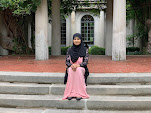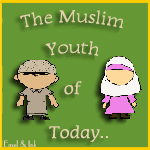The 2nd type
The second type of teenager is the one who is corrupt in his beliefs, irresponsible in his conduct, himself misled, engulfed in vice, does not accept the truth from anyone nor does he refrain from falsehood and he is selfish in his conduct. He is a teenager who is stubborn. He does not yield to the truth nor does he renounce falsehood. He does not care about his neglect of the rights of man nor the rights of Allah. He is a confused teenager bereft of impartiality in his thinking and in his behavior. Likewise, he lacks balance in all his affairs.
He is a teenager who is conceited with his own opinion as if truth flows from his tongue. He, in his opinion, is free from mishaps, while others are a source of mistakes and slip-ups as long as they contradict his option.
He is a teenager who has turned away from the straight path in his Deen and the accepted norms of conduct. The evil of his conduct has been made alluring to him. Therefore, he regards it as virtuous. Thus he is the greatest of losers in respect of his deeds. These are the ones whose efforts have been wasted in this life, while they presumed that they were doing good.
He is an evil omen upon himself and a misfortune for his society, one who is driving his nation towards the lowest stage. He is a barrier between his nation and their respect and munificence, a lethal influence, difficult to treat - except if Allah wishes. Allah has power over everything.
The 3rd type
The third type of teenager is he who is confused and doubtful. He recognizes the truth and is content with it. He lives in a guarded society except that the doors of evil have opened up for him from every direction. This has created doubt in his beliefs, deviation in his conduct, weakness in his action, a foray from known practices and an influx of diverse falsehood. Thus, he is in eternal thought and inner search. Opposing this influx or movement (of falsehood) is uncertainty. He does not know whether the truth lies in the prevailing ideologies or in the way of his pious predecessors and his safeguarded society. He is thus in doubt - sometimes he accords preference to one side and sometimes the next according to the strength of the influx of these thoughts.
This type of teenager is passive in his life. He is in need of captivating strength which will guide him towards the enclosure of truth and the path of goodness. How easy will this not be if Allah prepares for him a person who calls towards good, who is wise, knowledgeable and of good intentions?
These types of teenagers are found in abundance. They obtain a smattering of Islamic education but they acquire much more secular knowledge which conflicts with the basics of Deen either in reality or in their presumptions. Thus they are helpless between the 2 cultures. It is possible for them to gain liberation from this helplessness by establishing themselves upon Islamic education and acquiring this education from it's original sources - the book of Allah (the Qur'aan) and the Sunnah (traditions) of Muhammad sallallaahu 'alayhi wa sallam at the hands of devoted Ulema (learned men) - and this is not difficult for them.
The digression of the youth and their problems
The reasons for the digression and the difficulties of the youth are many and varied. Man, during the phase of youths is to a large extent in the process of the development of the body, thought processes and the mind, because this is the phase of growth during which he undergoes rapid changes. In this stage it is of extreme importance that the tools of self-control are prepared for him coupled with wise leadership to steer him towards the straight path.
From amongst the important reasons for this retrogression are the following:
1) Idleness- Idleness is a malady which kills thought processes, the mind and the strength of the body, because the body is always in need of movement and work. Thus, when the body is idle, thoughts become dull and the mind weakens, body movements weaken and devilish insinuations and evil thoughts form on to the heart. Many times an evil intention is created as a result of this suppression which was a direct consequence of idleness. The cure for this problem is that the teenage should strive in the attaining of work which befits him like reading, business or writing which will then become a barrier between him and his idleness. It is necessary that he becomes a stable member of society, working in his society for himself and for others.
2) Alienation and aloofness between the youth and the elderly members of their families or between the youth and others- We see some elders witnessing deviation in their youth but they hesitate, are disconcerted, helpless to strengthen them and dependent from reforming them. The result of this is hatred for these youth, estrangement from them and a don’t-care attitude towards their condition, whether their condition is one of piety or corruption. Sometimes they pass judgment concerning all the youth which translates into a blank impression of the youth in general. This splits the community whereby the youth and their elders begin looking at one another with the eyes of contempt. This is amongst the greatest dangers that can encompass human society. The cure for this problem is that the youth and their elders should make an effort to eradicate this alienation between them and trust everyone because the society together with its youth and elders are like one body. When one part of it decays, it leads to the decay of the whole body. It is incumbent upon the elders that they give deep thought to their responsibility concerning the reformation of the youth and dispel this contagious despondency from their hearts, because Allah has power over everything. How many corrupt people did Allah not guide, after which they became beacons of guidance and callers towards reform? It is necessary for the youths to entertain respect, regard for the opinions and acceptance of the guidance of their seniors who experienced the realities of life which these youth have not. When the wisdom of the seniors will meet with the strength of the youth, the society will attain prosperity with the will of Allah.
3) Liaison with deviated and corrupt people and befriending them- This has a great effect on the mind, the thinking and ways of the youth. For this reason Nabi sallallaahu 'alayhi wa sallam is reported to have said: "A person is on the Deen (religion) of his companion, so each one of you should take care in the matter of who he befriends." He sallallaahu 'alayhi wa sallam also said: "The similitude of an evil companion is like an ironsmith using an oven. Either you will burn your clothes in his company or you will experience an offensive odor." (Hadith) The sure for this problem is that the teenager should choose for his companionship those who are good and intelligent so that he may benefit from their virtue, reformed ways and intelligence. He should weigh up their condition and reputation before befriending them. If they are people of character, virtue, correct Deen and good reputation, then befriend them. If they do not possess these qualities, then it is incumbent to distance oneself from them so that one is not deceived by sweet talk and beautiful outward appearances. This is deception and misguidance. This path is traversed by evil people to allure the simple-minded in order to increase their multitude and conceal their evil condition. A poet has said it most beautifully. “Test men when you intend to befriend them, scrutinize and study their affairs”.
4) Reading of destructive periodicals, booklets and magazines which create doubt in the Deen of a person and in his beliefs- This draws a person towards the abrogation of virtuous character and lands him in Kufr (disbelief) and vice. This is especially true when the teenager does not possess deep Deen related education and acute thinking by means of which he can differentiate between truth and falsehood, benefit and harm The reading of these types of books totally confounds them because they imbibe a false pleasure in the minds and thinking of the youth without reservation. The cure for this problem is that he should keep away from these books and read other books which will plant in his heart the love of Allah and his Rasool sallallaahu 'alayhi wa sallam and the reality of Eemaan (belief) and good deeds. No doubt his inner self will entice him greatly towards those books which he loved previously and make him feel discontent with other beneficial woks. This is similar to the position of that person who lights with his inner self to establish the obedience of Allah in his life, but his soul rebels and becomes involved in futility and lies. The most important of beneficial books is the book of Allah and those which the people of knowledge have written by way commentary with correct transmission. In the same way, the Sunnah of the Messenger of Allah sallallaahu 'alayhi wa sallam is beneficial, then that which the people of knowledge have written by extracting from these two sources or by way of deep understanding.
5) The impression of some youth that Islam is a curtailment of freedom and a repression of strength- Thus they turn away from Islam regarding it as retrogression and a barrier between them and progress. The cure for this problem is that the veil of the reality of Islam be lifted from these youth who are ignorant of its reality because of their wrong nations, inadequate knowledge or both. Islam does not restrict freedom but it is a control and a correct channeling for it, so much so that the freedom of one person does not clash with the freedom of the next person. General freedom leads to chaos and eruption. It is for this reason that the injunctions of Deen are called Hudood (limits). If the injunction is one of prohibition, Allah says: "They are the limits imposed by Allah, do not approach them." [2:187] If it is one of consent, Allah Ta'ala says, "These are the limits imposed by Allah, do not transgress them." [2:229] This is the difference between restriction (which is the impression of some) and control and guidance which the most wise, the all-knowing Allah has decreed for his servants. There is no basis for this problem because systemization is a reality in all domains and man by nature is submissive to this systematic reality. He is submissive to the pressure of hunger and thirst and to the system of his food and drink as far as quantity, quality and type is concerned so that he may safeguard his body and its health. He is in the same way submissive to the system of his society, holding on to the customs of his city in its dwellings, garb and modes of transport. If he does not subject himself to this, he will be considered as being abnormal and he will be treated the way extraordinary people are treated. Life is totally a submission to specified limits so that everything progresses according to its intended aim. This subjugation is for the order of society, e.g. submission which is necessary for the reformation of society and the prevention of anarchy. In the same way, submission to the system of the Sharee'ah entails that which is necessary for the reformation of the nation. So how can some people be annoyed with it and think of it as being a restriction of freedom? Verily this is a great untruth and a baseless, evil presumption. Islam in the same way is not a suppression of capabilities. It is a wide sphere for all strengths. Islam calls towards reflection so that man contemplates and his mind and thoughts grow. Allah Ta'ala says: "Say O Muhammad, I advise you of one thing only, that you stand up in two's and [single] and then reflect." [34:46] and Allah says: "Say O Muhammad, see what is in the heavens and the earth." [10:101] Islam does not confine itself to calling towards contemplation and deep thought but it denounces those who do not think, observe and contemplate. Allah Ta'ala says: "Have they not considered the dominion of the heavens and the earth, and what things Allah has created?" [7:185] Allah Ta'ala says: "Have they not pondered upon themselves? Allah did not create the heavens and the earth and that which is between them, except with truth." [30:8] And Allah Ta'ala says: "And he who we give old age. We reverse him in creation (making him go back to weakness after strength), do you not ponder?" [36:68]
The order of observing and pondering opens up the power of the mind and thoughts, so how can some people say; that it restricts capabilities? Dreadful is the word they utter; they only speak a lie. Islam has legalized for its people all pleasures in which there is no harm for the individual either physically, mentally or spiritually. Islam has authorized the eating and drinking of all pure things: "O believers, eat of the good things from which we have provided you, and render thanks to Allah." [2:172] Allah Ta'ala says: ''And eat and drink and do not waste. He does not love those who waste." [7:31] Islam has legalized all clothing to the demands of wisdom and nature: "O Children of Adam! We have revealed unto you clothing to conceal your shame, and splendid countenance, but the clothing of piety; that is best." [7:26] Allah Ta'ala says: "Say O Muhammad, who has forbidden the beautiful (gifts) of Allah which He has produced for His servants and the pure things (which He has produced) for sustenance? Say, they are in the life of this world for those who believe, and only for them on the Day of Judgment.'' [7:32] He has authorized enjoyment of women by legitimate Nikaah (marriage): Allah Ta'ala says: "Marry women of your choice, two, or three, or four but if you fear that you shall not be able to deal justly with them, then only one." [4:3] In the domain of economics, Islam has not suppressed the capabilities of its people but legalized for them all business dealings which are just and emanate from mutual happiness. Allah says: "Allah has permitted trade and forbidden usury." [2:276] And he says: "It is He who has made the earth manageable for you, so traverse through its tracks and eat of the sustenance which He provides, and He is responsible for the resurrection." [67:15] and He says, "And when the prayer is finished, then disperse through the land, and seek of the bounty of Allah." [62:10] After all this, is the impression or saying of some people correct, that Islam suppresses capabilities?
TO BE CONTINUED...
Source: http://www.kalamullah.com/youth01.html
Subscribe to:
Post Comments (Atom)





No comments:
Post a Comment